
When Should Parents Begin 4+ Exam Prep?
Ready or not, those 4+ exams are on the horizon! Parents often find themselves wondering when to kick off 4+ exam prep to ensure their little ones are set for success. Early preparation can make a big difference, but timing it right is crucial.
In this article, we’ll explore what 4+ exams entail, when to start prepping, and key factors that influence that timing. Let’s dive in and discover how to navigate this important phase!
Importance of Early Preparation
Research indicates that children who begin their exam preparation early can enhance their performance by as much as 20% compared to their peers who start later. To make the most of these advantages, parents can support their children by encouraging them to set specific, achievable goals, such as studying a certain number of chapters each week.
Incorporating short, focused study sessions—lasting no longer than 30 minutes—followed by breaks can help sustain motivation and improve retention.
Utilising tools like Quizlet for creating flashcards can facilitate quick reviews, while planners or applications like Trello can assist in tracking progress effectively.
Furthermore, fostering discussions about the material can deepen understanding, transforming study time into a more interactive and engaging experience.
Overview of 4+ Exams
The 4+ exams serve as important milestones that assess a child’s readiness for future academic challenges, encompassing subjects such as maths, reading, and cognitive skills.
These exams come in various formats, including multiple-choice questions, open-ended responses, and performance tasks. Each format influences learning strategies differently; for example, multiple-choice tests often prioritise rote memorisation, while open-ended questions demand critical thinking and comprehension skills.
Performance tasks can further enhance engagement by allowing students to showcase their understanding through projects or practical applications. Educators can take advantage of this diverse assessment landscape to customise study plans that emphasise students’ strengths, ultimately improving their learning outcomes.
Understanding 4+ Exams
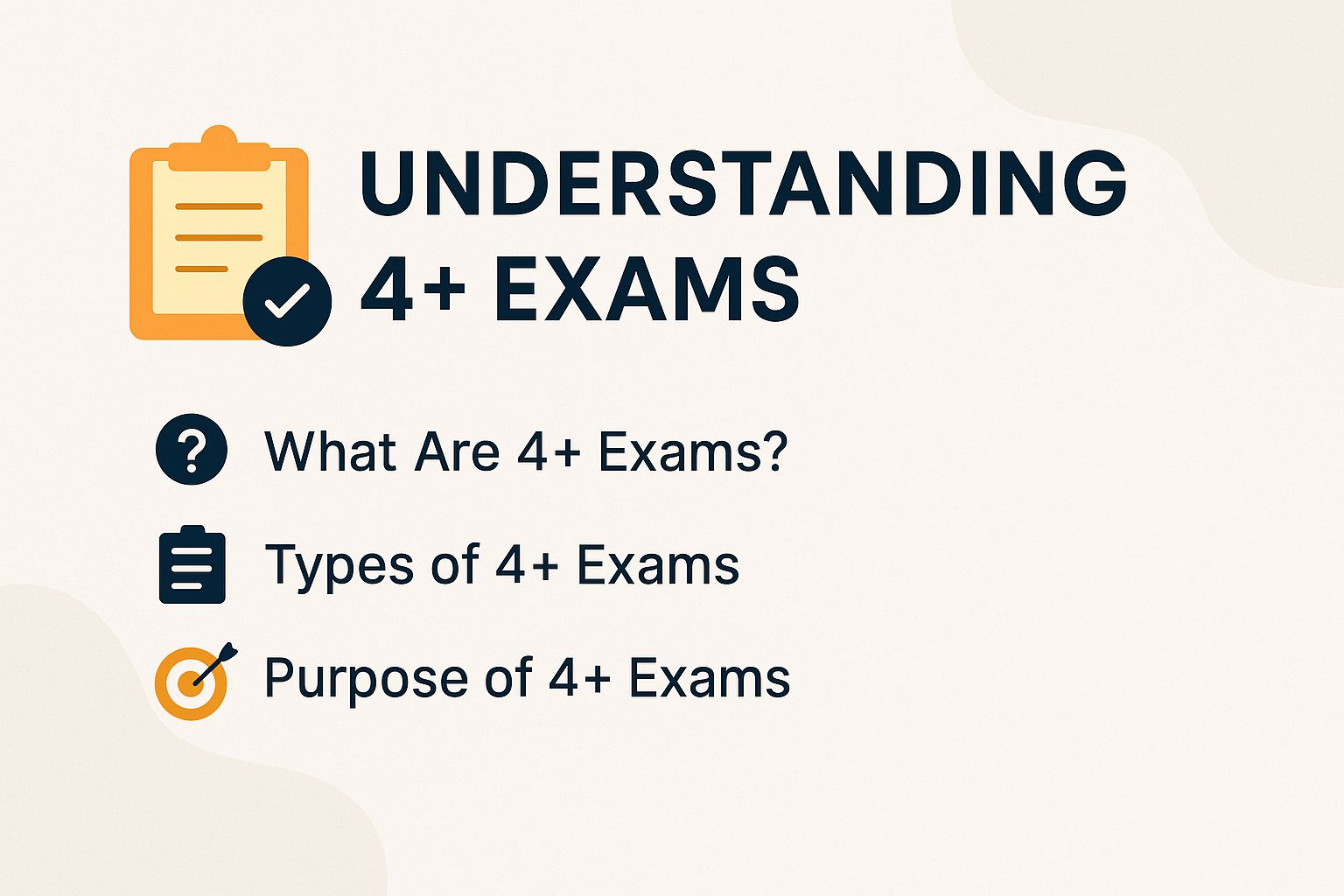
It is essential for parents to understand the nuances of 4+ exams in order to effectively navigate their child’s educational journey. If you’re interested in knowing what schools genuinely seek during these assessments, our detailed article on 4+ Assessment – What Are Schools Really Looking For? provides valuable insights.
What Are 4+ Exams?
4+ exams refer to standardised assessments designed for children aged four and older, focusing on their cognitive and academic skills. These exams typically evaluate several key areas, including language development, mathematical reasoning, and problem-solving abilities.
Some common examples of these assessments include:
The Early Years Foundation Stage Profile (EYFSP), which is used in the UK to determine children’s readiness for school.
The CogAT (Cognitive Abilities Test), which measures various reasoning skills.
The WISC (Wechsler Intelligence Scale for Children) is often employed to identify giftedness in students.
Performing well in these exams can have a substantial impact on educational placements and access to advanced programmes, ultimately laying the groundwork for a child’s future academic path.
Types of 4+ Exams
There are various types of 4+ exams, which include entrance tests for independent schools, state assessments, and subject-specific evaluations.
Entrance tests for independent schools evaluate a pupil’s aptitude and readiness for a demanding academic environment. In contrast, state assessments, such as the Smarter Balanced test in the USA, measure overall educational progress against state standards.
Subject-specific evaluations, typically administered at the conclusion of courses, assess particular academic knowledge. A good example of this is the Advanced Placement (AP) exams, which cover subjects like calculus or literature.
The purposes of these exams differ significantly: entrance exams are designed to screen candidates, state assessments provide insights into curriculum effectiveness, and subject tests can offer the opportunity to earn university credits.
It is also important to note that each region may have its own variations and requirements, adapting to local education standards.
Purpose of 4+ Exams
The primary purpose of 4+ exams is to evaluate a child’s readiness for academic challenges and ensure that they align with curriculum standards.
These exams fulfil several important roles:
They identify a child’s strengths and weaknesses in core subjects, which helps educators tailor their instruction to meet individual needs.
Additionally, these assessments provide valuable feedback to parents, facilitating constructive conversations about their child’s progress and enabling them to support learning at home.
The results can influence future educational decisions, such as determining the appropriateness of advanced classes or the necessity for additional support services.
Furthermore, schools may utilise standardised metrics derived from these insights to create a more effective learning environment.
When to Start 4+ Exam Prep
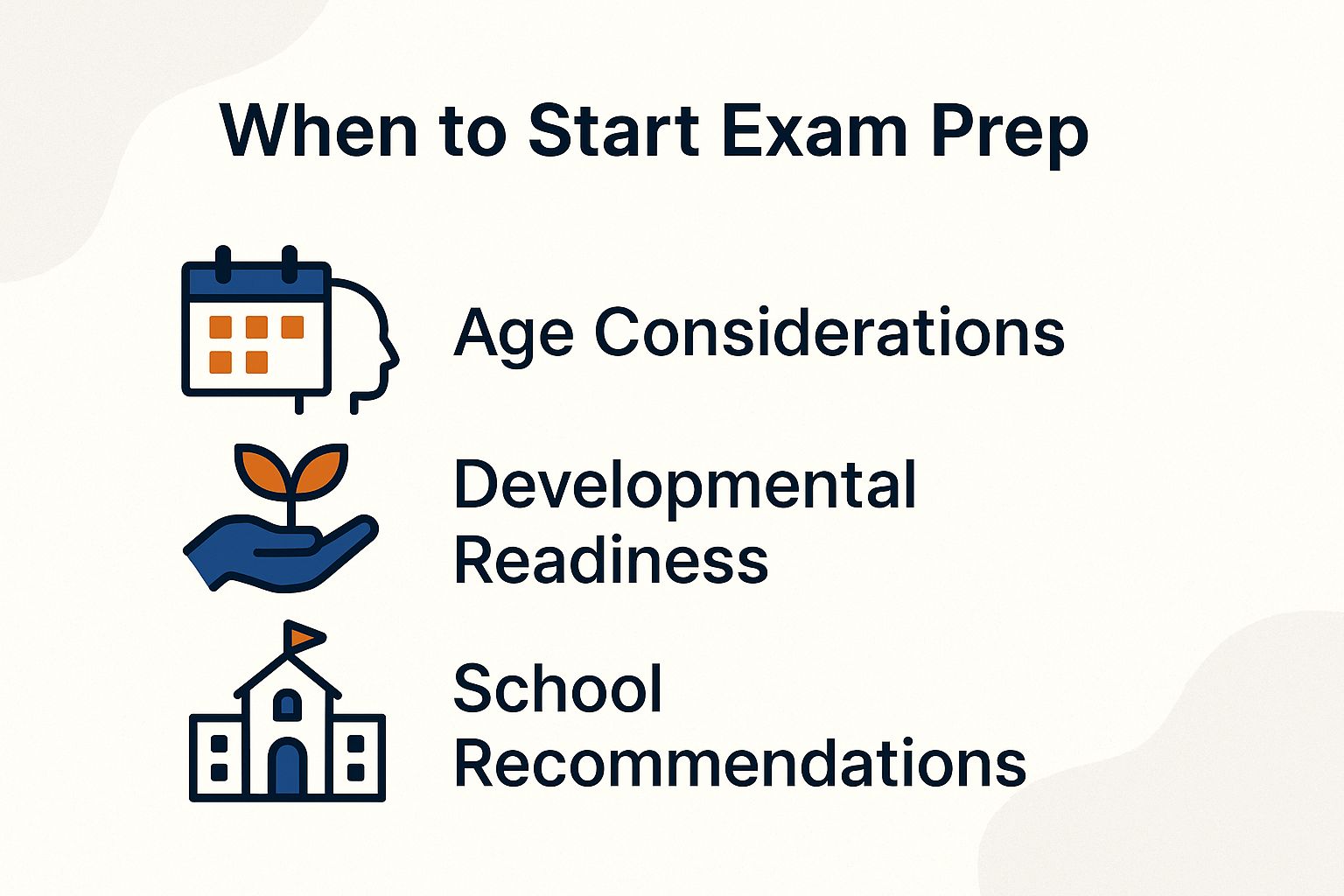
Deciding when to begin exam preparation is essential for maximising a child’s performance while also helping to alleviate any anxiety they may feel.
Age Considerations
Most experts suggest beginning exam preparation around the age of four, as this period aligns well with key cognitive development milestones and the child’s readiness to learn. At this age, children typically exhibit improved focus and a greater ability to process information, making it an ideal time to introduce structured learning.
Incorporating playful methods, such as educational games and interactive storytelling, can significantly enhance engagement. For instance, utilising resources like ‘ABCmouse’ or ‘Khan Academy Kids’ may prove particularly beneficial.
It is advisable to aim for short, regular study sessions lasting about 15-20 minutes, covering a variety of subjects to support well-rounded development. Additionally, it is important to ensure emotional readiness by being attentive to any signs of stress or frustration.
Developmental Readiness
Assessing a child’s developmental readiness is crucial to ensuring they are well-prepared for the demands of 4+ exam preparation. To evaluate your child’s readiness, it is important to observe their cognitive skills, including problem-solving and critical thinking, as well as indicators of emotional maturity, such as their ability to cope with frustration and manage anxiety.
Engaging your child in activities like puzzles or age-appropriate games can provide insights into their reasoning abilities. Additionally, encouraging open discussions about their feelings regarding the upcoming exams can help you understand their emotional preparedness.
Consider utilising tools such as age-specific readiness checklists available online. These resources offer structured criteria to measure both mental and emotional development.
By taking this comprehensive approach, you can identify and address any gaps in readiness before formal exam preparation begins.
School Recommendations
Many schools offer guidelines regarding the appropriate time to begin exam preparation, often suggesting a timeline that corresponds with their curriculum pacing. Typically, educators advise starting preparation at least six to eight weeks prior to the exams. This duration allows for a gradual learning process and helps to alleviate stress.
For example, if a student is preparing for a final maths exam, they might spend the first four weeks reviewing fundamental concepts and refining problem-solving techniques.
The subsequent two weeks could be dedicated to practice exams and timed drills, utilising online resources such as Khan Academy for focused practice. During the final two weeks, the emphasis should shift to relaxation and revision, ensuring the student feels confident and adequately prepared for the exam.
Factors Influencing Prep Timing
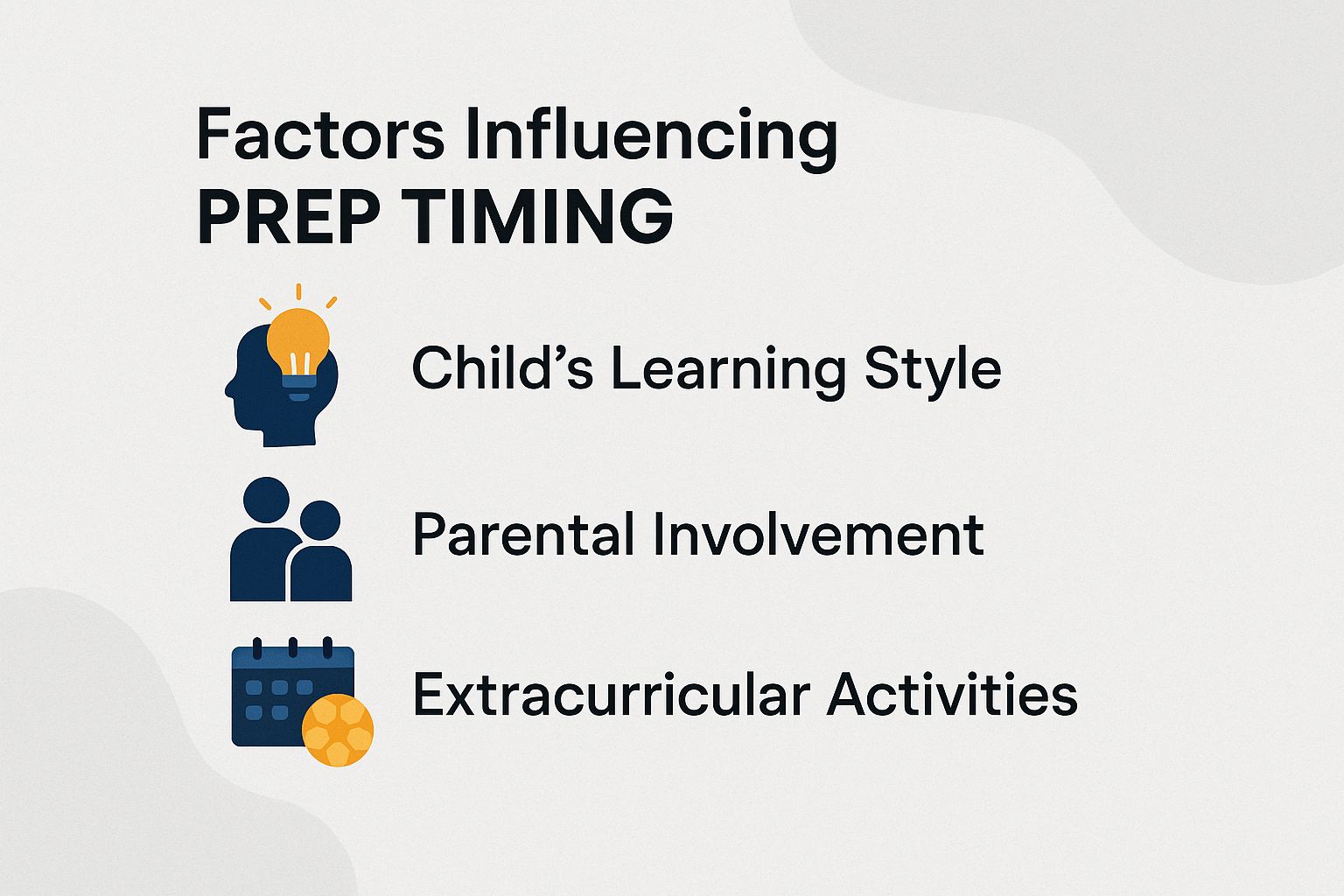
There are various factors that can affect the timing of exam preparation, such as a child’s unique learning style and the dynamics within their family.
Child’s Learning Style
Understanding a child’s learning style—whether it is visual, auditory, or kinaesthetic—can significantly influence the timing and methods used in exam preparation.
For example, visual learners tend to excel with diagrams and colour-coded notes, so incorporating tools like flashcards or mind maps can greatly enhance their retention of information.
On the other hand, auditory learners may find that discussing concepts aloud or utilising rhythm and music proves beneficial for memorising facts. Kinaesthetic learners, who thrive on hands-on experiences, can solidify their understanding through educational games or model-building activities.
To determine a child’s preferred learning method, it can be helpful to ask them how they best remember information or to experiment with various techniques and observe which ones resonate most with them.
By tailoring study strategies to align with these learning styles, one can create a more effective and supportive learning environment.
Parental Involvement
Active parental involvement plays a significant role in enhancing a child’s motivation and readiness for exams, making it an essential factor in determining the timing of their preparation.
To support your child effectively during this critical period, it is beneficial to establish a dedicated study timetable together. Setting specific goals, such as completing a certain number of chapters each week, can provide clarity and direction. Regularly reviewing this plan ensures that both you and your child stay on track.
Creating a conducive learning environment is also important. Minimising distractions by designating a quiet study space equipped with the necessary materials can greatly enhance focus. Engaging in regular discussions about their subjects encourages your child to express any difficulties they may encounter openly.
Incorporating tools like educational apps, such as Quizlet for flashcards, can make studying more interactive and enjoyable. This approach helps foster a collaborative learning atmosphere, making the exam preparation process more engaging for your child.
Extracurricular Activities
Extracurricular activities can indeed be beneficial; however, they may also influence the timing and intensity of exam preparation if not managed with care.
To achieve an effective balance between extracurricular commitments and study schedules, it is important to prioritise your activities based on their significance and the time they require.
A helpful approach is to create a weekly calendar that designates specific hours for studying as well as for extracurricular activities. For example, if you have sports practice twice a week, consider scheduling your most challenging study sessions before or after practice when your mind is still fresh.
Additionally, using productivity tools such as Trello or Todoist can be quite beneficial for tracking assignments and deadlines, helping you remain organised and focused. It may also be useful to communicate with coaches or club leaders about your study needs, ensuring that your responsibilities are in alignment with your academic goals.
Strategies for Effective Preparation
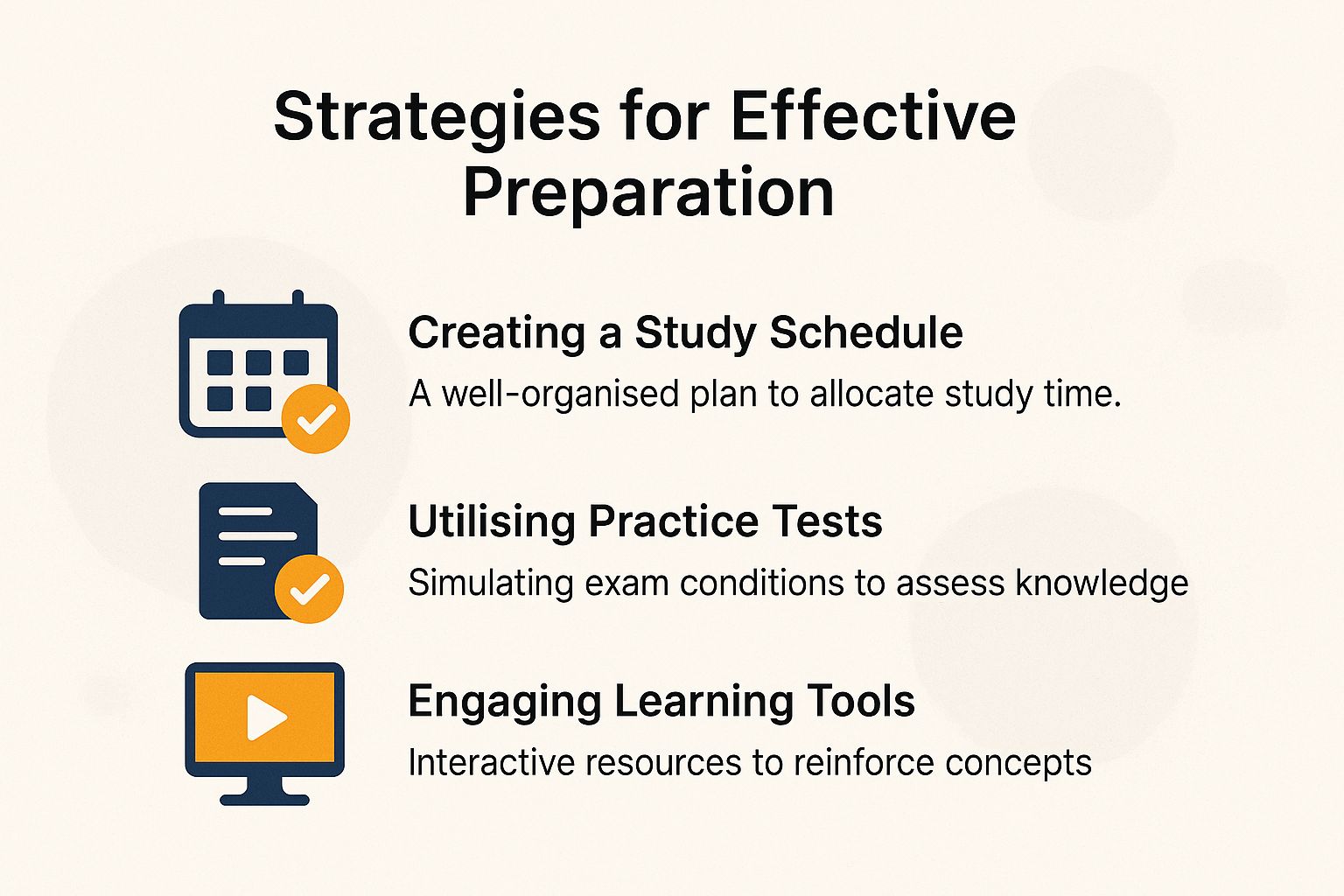
Implementing effective preparation strategies can greatly improve a child’s confidence and success rate during exams. By ensuring that students are well-prepared, they are more likely to approach their exams with a positive mindset and achieve better results. In fact, fostering a growth mindset can be a hidden gem in building resilience for exams, helping young learners tackle challenges with confidence.
Creating a Study Schedule
A well-structured study timetable is essential for managing exam preparation effectively, as it facilitates a balanced approach to review and practice.
To begin, outline your daily study blocks using tools such as Trello or Google Calendar. Start by identifying your exam dates and core subjects, and then assign specific topics to each study session.
For instance, you might allocate Mondays for maths and Wednesdays for history. It is important to prioritise flexibility; therefore, consider setting buffer times in your timetable to accommodate any necessary adjustments.
Additionally, implementing the Pomodoro technique can significantly enhance your focus. This technique involves studying for 25 minutes, followed by a 5-minute break.
Regularly reviewing your progress will help maintain motivation, allowing you to adjust your plan as your exam dates draw nearer.
Utilising Practice Tests
Incorporating practice tests into your preparation routine can significantly enhance your familiarity with exam formats and strengthen your test-taking strategies.
To find effective practice tests, consider utilising platforms such as Khan Academy, which offers a variety of free resources designed for specific exams. Alternatively, TestPrepOnline provides a wealth of practice questions and detailed answer explanations for a subscription fee.
It is advisable to aim for two to three practice sessions each week, gradually increasing the duration as your exam date approaches.
After completing each test, take the time to review any incorrect answers to identify knowledge gaps and adjust your study focus accordingly. This structured approach can effectively boost your confidence and performance on the day of the exam.
Engaging Learning Tools
Interactive learning tools can significantly enhance exam preparation by making it more engaging and effective, accommodating various learning styles and preferences.
For example, by integrating Quizlet into your child’s study routine, they can create digital flashcards for essential concepts, which can improve memory retention through interactive quizzes.
Similarly, Duolingo provides an enjoyable method for supplementing vocabulary learning in foreign languages, as its game-like interface keeps students motivated.
It is beneficial to encourage your child to utilise these tools during short, focused study sessions—perhaps 20 minutes with Quizlet followed by 15 minutes with Duolingo.
This balanced approach not only makes study time more enjoyable but also introduces variety, helping to sustain their interest and enhance their overall learning outcomes.
Common Mistakes to Avoid
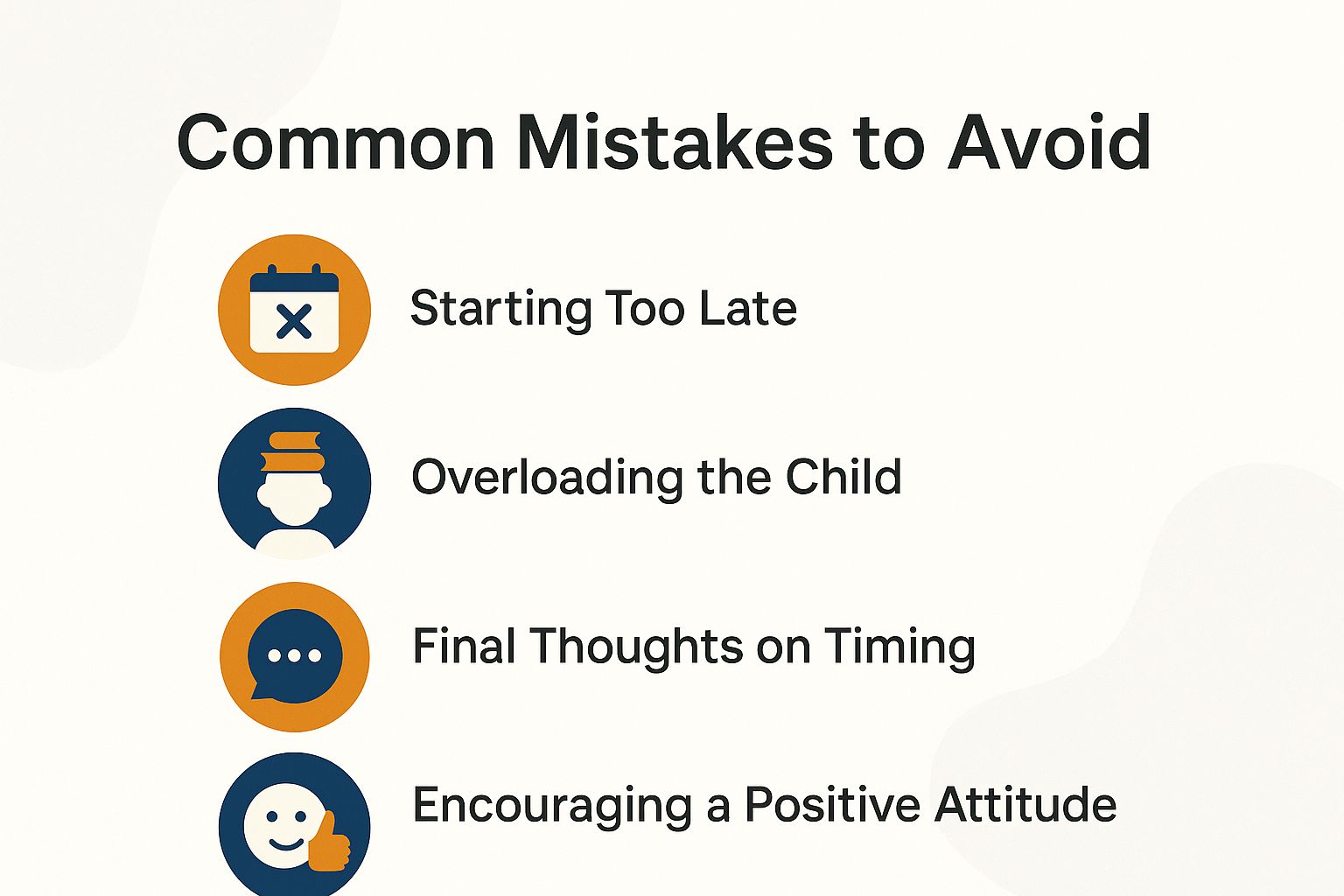
Avoiding common mistakes in exam preparation can help both parents and children avoid unnecessary stress and setbacks. For an extensive analysis on this topic, our 7+ Exam Guide covers everything you need to know.
Starting Too Late
Starting exam preparation too late can lead to increased anxiety and insufficient skill development, which can ultimately impact performance. To help combat procrastination, it is beneficial for parents to establish a structured timeline. Ideally, preparation should begin at least eight weeks before the exams.
This eight-week period can be broken down into manageable blocks:
Weeks 1-2 for familiarisation with the syllabus,
Weeks 3-5 for in-depth topic reviews,
Weeks 6-8 for practice exams.
For example, incorporating weekly quizzes can enhance retention by up to 50%, according to research findings. Platforms like Quizlet or Khan Academy offer interactive resources that can be quite helpful.
Establishing a consistent study routine not only helps to reduce stress but also fosters a positive learning environment, effectively preparing students for success.
Overloading the Child
Overloading a child with excessive study material can lead to burnout and decreased motivation, ultimately undermining the benefits of preparation. It is essential to maintain a balanced approach to study time by implementing structured study sessions that include regular breaks.
One effective method is the Pomodoro Technique:
Study for 25 minutes.
Take a 5-minute break.
After completing four of these sessions, reward yourself with a longer break of 15 to 30 minutes.
Additionally, encourage leisure activities such as sports or reading for pleasure. These activities can help rejuvenate the mind. This strategy not only sustains engagement but also reinforces learning by allowing the brain ample time to process information.
Final Thoughts on Timing
The timing of exam preparation should ultimately be customised to meet each child’s unique needs and circumstances. To develop an effective study schedule, it is important to assess your child’s learning style and identify their daily energy peaks.
For example, a visual learner may thrive during study sessions that utilise colourful diagrams, particularly in the morning when they are most alert.
It is also beneficial to incorporate breaks into the study routine. The Pomodoro Technique, which suggests 25 minutes of focused study followed by a 5-minute break, is one effective method. This approach can help prevent burnout and maintain your child’s interest in the material.
Additionally, it is wise to regularly check in on your child’s stress levels and make necessary adjustments to the schedule, ensuring that their well-being takes precedence over rigid timelines.
Encouraging a Positive Attitude
Fostering a positive attitude towards examinations can significantly reduce anxiety and enhance performance outcomes for children. To cultivate this positivity, it can be helpful to celebrate small achievements, such as completing study sessions or mastering challenging topics.
One effective method is to create a reward system that offers small treats or extra playtime after reaching each milestone. Additionally, encouraging open communication about feelings related to examinations is essential; regularly checking in with your child allows you to discuss their thoughts and concerns.
Tools like mood journals can be quite beneficial in this context, as they help children express their emotions and identify patterns in their feelings. By recognising both their progress and the challenges they face, you enable children to approach examinations with greater confidence.
Frequently Asked Questions
When Should Parents Begin 4+ Exam Prep?
Parents should begin 4+ exam prep at least 6 months before the exam date to allow enough time for their child to prepare and feel confident.
What is the 4+ exam?
The 4+ exam is an entrance exam for children applying to independent schools in the United Kingdom at the age of 4.
Why is it important to start early with 4+ exam prep?
Starting early with 4+ exam prep allows children to become familiar with the exam format and content and gives them time to develop the necessary skills and knowledge.
What are some good strategies for 4+ exam prep?
Some effective strategies for 4+ exam prep include practising with past papers, using educational resources and materials, and working with a tutor.
Can parents help with 4+ exam prep?
Yes, parents can play a crucial role in supporting their child’s 4+ exam prep by providing a structured study schedule, creating a positive learning environment, and offering encouragement and motivation.
Is it necessary to hire a tutor for 4+ exam prep?
While hiring a tutor is not necessary for 4+ exam prep, it can be beneficial for children who need additional support or struggle with certain subjects. Tutors can also provide valuable tips and techniques for taking the exam.



